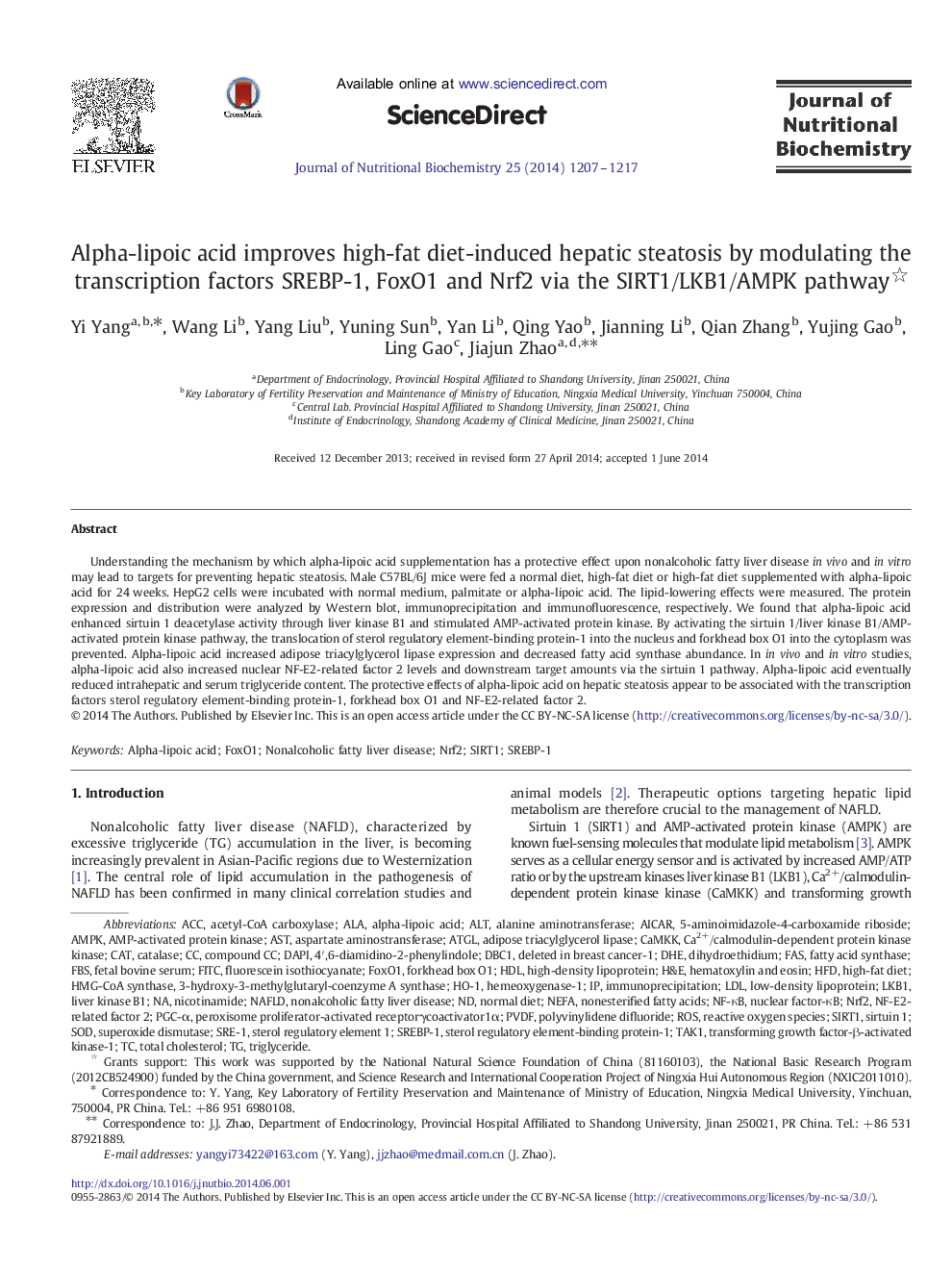| Article ID | Journal | Published Year | Pages | File Type |
|---|---|---|---|---|
| 8337078 | The Journal of Nutritional Biochemistry | 2014 | 11 Pages |
Abstract
Understanding the mechanism by which alpha-lipoic acid supplementation has a protective effect upon nonalcoholic fatty liver disease in vivo and in vitro may lead to targets for preventing hepatic steatosis. Male C57BL/6J mice were fed a normal diet, high-fat diet or high-fat diet supplemented with alpha-lipoic acid for 24Â weeks. HepG2 cells were incubated with normal medium, palmitate or alpha-lipoic acid. The lipid-lowering effects were measured. The protein expression and distribution were analyzed by Western blot, immunoprecipitation and immunofluorescence, respectively. We found that alpha-lipoic acid enhanced sirtuin 1 deacetylase activity through liver kinase B1 and stimulated AMP-activated protein kinase. By activating the sirtuin 1/liver kinase B1/AMP-activated protein kinase pathway, the translocation of sterol regulatory element-binding protein-1 into the nucleus and forkhead box O1 into the cytoplasm was prevented. Alpha-lipoic acid increased adipose triacylglycerol lipase expression and decreased fatty acid synthase abundance. In in vivo and in vitro studies, alpha-lipoic acid also increased nuclear NF-E2-related factor 2 levels and downstream target amounts via the sirtuin 1 pathway. Alpha-lipoic acid eventually reduced intrahepatic and serum triglyceride content. The protective effects of alpha-lipoic acid on hepatic steatosis appear to be associated with the transcription factors sterol regulatory element-binding protein-1, forkhead box O1 and NF-E2-related factor 2.
Keywords
FASCaMKKaspartate aminostransferaseCATTAK1HDLNEFANrf2sirtuin 1PVDFDAPIHO-1FOXO1HFDALAALTAMPKAICARSirt1LKB1Ca2+/calmodulin-dependent protein kinase kinaseNF-κBACCDBC1NAFLDFBS3-Hydroxy-3-methylglutaryl-coenzyme A synthaseSREBP-1FITCHemeoxygenase-14′,6-diamidino-2-phenylindole5-Aminoimidazole-4-carboxamide ribosideAMP-activated protein kinaseH&Ehigh-density lipoproteinHMG-CoA synthaseROSASTAlanine aminotransferaseAtglacetyl-CoA carboxylasealpha-lipoic acidfatty acid synthaseNonesterified fatty acidsNonalcoholic fatty liver diseaseImmunoprecipitationtriglycerideForkhead box O1polyvinylidene difluoridedihydroethidiumhigh-fat dietnormal dietSODfetal bovine serumSuperoxide dismutaseNF-E2-related factor 2nuclear factor-κBfluorescein isothiocyanateadipose triacylglycerol lipaseLow-density lipoproteinLDLNicotinamideHematoxylin and EosinDHESterol regulatory element-binding protein-1Catalasetotal cholesterolliver kinase B1Reactive oxygen species
Related Topics
Life Sciences
Biochemistry, Genetics and Molecular Biology
Biochemistry
Authors
Yi Yang, Wang Li, Yang Liu, Yuning Sun, Yan Li, Qing Yao, Jianning Li, Qian Zhang, Yujing Gao, Ling Gao, Jiajun Zhao,
